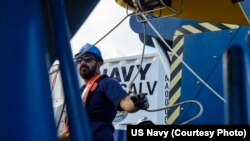The captain of the U.S. cargo ship El Faro reported "a hull breach" and said a hatch had blown open before the vessel sank off the Bahamas in a hurricane earlier this month, the National Transportation Safety Board said on Tuesday.
In a recorded satellite phone call Captain Michael Davidson told the ship's owner he had "a marine emergency" after taking on water in one of the holds, the NTSB said in an update on its two-week-old investigation of the sinking.
It said the captain also reported that the ship had lost its main propulsion unit and that engineers could not get it restarted.
The El Faro and its 33 mostly American crew members disappeared on Oct. 1 after sailing into the path of Hurricane Joaquin while en route from Jacksonville, Florida, to Puerto Rico in the worst cargo shipping disaster involving a U.S.-flagged vessel since 1983.
The ship's owner, New Jersey-based Tote Inc, has previously said the loss of propulsion is likely what doomed the ship as it was engulfed by high seas whipped up by Joaquin.
According to the NTSB, electronic distress alerts were received by the U.S. Coast Guard from three separate sources on board El Faro but the Coast Guard never had direct voice communications with the ship.
It was not clear if the hull breach was directly related to the ship's loss of propulsion, perhaps due to water flooding the engine room and short-circuiting the ship's generators.
The El Faro had successfully completed its most recent inspections and surveys by the Coast Guard and the American Bureau of Shipping "meeting all rules and regulations," the NTSB said in Tuesday's update.
It said Tote told investigators that El Faro was undergoing "modifications" by welders and machinists prior to redeploying to the U.S. West Coast.
A boiler service company had recommended service to both the ship's boilers during an upcoming drydock that had already been scheduled for Nov. 6, the NTSB added.
Tote has previously stated that the ship was undergoing engine room work, including during the last voyage but that it was unrelated to the propulsion system.
On Monday, a Navy salvage vessel hired by the NTSB left Virginia for the Bahamas to try to recover the ship's voyage data recorder, similar to the black box on airplanes, officials said.
The day after setting sail on the doomed voyage the captain emailed a company safety official that he planned to take a route south of the predicted path of the hurricane and would pass about 65 miles (105 km) from its center, the NTSB said.
U.S. forecasters issued an advisory early on Oct. 1 predicting seas of 30 feet (9 meters) with sustained winds increasing to 121 miles (195 km) per hour as the El Faro approached the wall of the eye of the hurricane, the NTSB noted.
According to electronic alert data sent five hours later by the El Faro, the ship's last reported position was about 20 miles (32 km) from the edge of the eye of the hurricane, the NTSB said.
Watch salvage operations:





